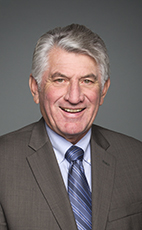Madam Speaker, Omar Khadr is a Canadian citizen and as such, the Government of Canada has an interest in his case and in his treatment in the hands of U.S. authorities.
Since his capture by U.S. forces, the Canadian government has sought to ensure that the treatment of Mr. Khadr is consistent with internationally recognized norms and standards for the treatment of juveniles, and that his age at the time the alleged events occurred is considered in all parts of the process.
Canada has requested that Mr. Khadr be provided with an education suitable to his needs and level and that he receive an independent medical and psychological assessment. Furthermore, Mr. Khadr's case has been raised on several occasions at the ministerial level with U.S. authorities.
The Canadian government has received unequivocal assurances from U.S. authorities that Mr. Khadr will not be subject to the death penalty. Canada has also sought to ensure that Mr. Khadr receives the benefits of due process, including access to Canadian counsel of his choice. Canadian government observers have been present at every one of his hearings before the military commission in Guantanamo Bay and the Court of Military Commission Review in Washington, D.C.
We facilitated the appointment of Mr. Khadr's Canadian lawyers as foreign attorney consultants in these proceedings and have consistently pressed for their access to their client. Canadian officials maintain a regular dialogue on all legal issues pertaining to Mr. Khadr's case, including with his defence team. In fact, Canadian officials met with Mr. Khadr's defence team only a few weeks ago.
Omar Khadr was arrested in 2002 by U.S. forces in the context of his alleged involvement in the armed conflict in Afghanistan following his alleged recruitment and use as a combatant by al-Qaeda. He has been detained by the U.S., has remained under U.S. jurisdiction continuously since then, and is now facing serious charges pursuant to U.S. legislation. As the report notes, these charges include murder in violation of the law of war, attempted murder in violation of the law of war, conspiracy, providing material support for terrorism, and spying. These are serious charges raising difficult issues of law and fact.
The administration of justice in the U.S. and in Guantanamo is a matter for U.S. authorities and the U.S. court system. The judicial process for a Canadian who is arrested outside Canada is governed by the laws and regulations of another country and not by Canadian law.
The Government of Canada can neither protect Canadians from the consequences of their actions nor override the decisions of local authorities. We cannot seek preferential treatment for Canadian citizens or try to exempt them from due process.
Just as Canadians would not accept a foreign government interfering with the Canadian judicial process, the Government of Canada cannot interfere in the judicial affairs of another country. That being said, Canada strongly believes that the fight against terrorism must be carried out in compliance with international law, including established standards of human rights and due process.
The government is obviously aware of the executive orders issued by the President of the United States in respect of Guantanamo Bay detainees. Pursuant to the first of these orders, proceedings against Mr. Khadr before the military commission are presently halted. The prosecution's request for an adjournment of 120 days was granted by the military judge on January 21. However, this does not mean that he is no longer subject to the U.S. criminal justice system.
A review will now be held which will determine how the United States authorities deal with the case of each and every Guantanamo detainee, including Mr. Khadr. We are not in a position to predict the outcome of this review.
Canadian officials have carried out regular welfare visits with Mr. Khadr. The goal of these visits has been to assess his condition and provide him with a measure of support and comfort items during his ongoing incarceration. Through these visits we have sought to have Mr. Khadr's detention conditions improved and made requests for medical treatment and educational support.
Interventions by Canadian officials have resulted, for example, in Mr. Khadr's move from a maximum security facility to a communal minimum security facility within Guantanamo Bay and improved medical treatment. The Canadian government has also facilitated access to him by Canadian defence counsel and made arrangements for telephone calls between Mr. Khadr and his family.
These efforts will continue for as long as Mr. Khadr remains in U.S. custody. Canadian officials also maintain a regular dialogue with the U.S. authorities concerning his case.
I will conclude by saying that the Government of Canada takes seriously its responsibility for the safety and security of its citizens abroad. When Canadian citizens find themselves in a difficult situation in a foreign country, it is the mandate of Foreign Affairs and International Trade Canada to ensure they are treated fairly and that they are afforded due process under the applicable local laws.
However, the judicial process for a Canadian who is arrested outside Canada is governed by the laws and regulations of the other country and not by Canadian law. In this regard, the choice of how to try detainees currently being held in Guantanamo Bay is a matter for the relevant U.S. authorities to decide.
Canada will continue to follow all developments closely, including those that may specifically affect the disposition of Mr. Khadr's case.

